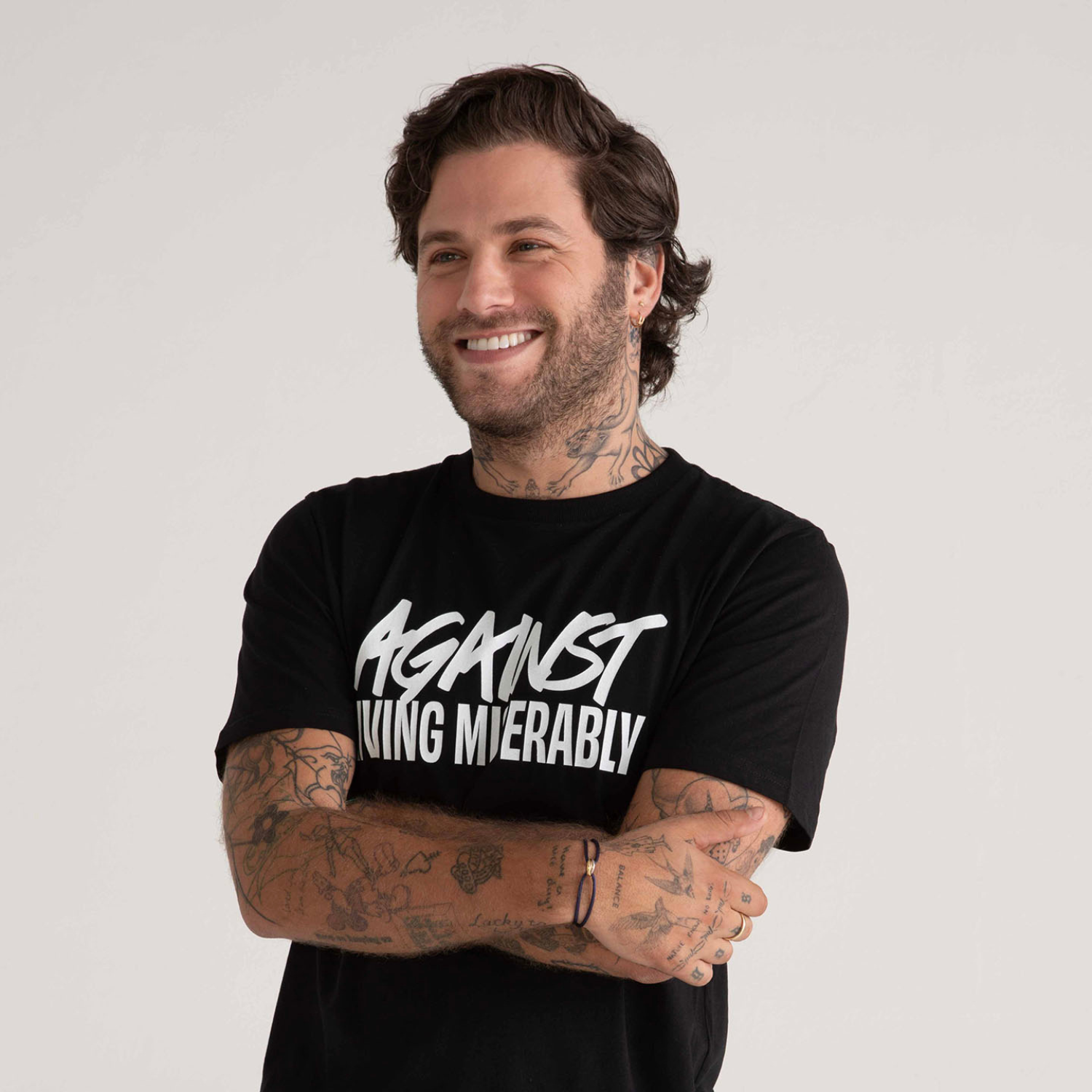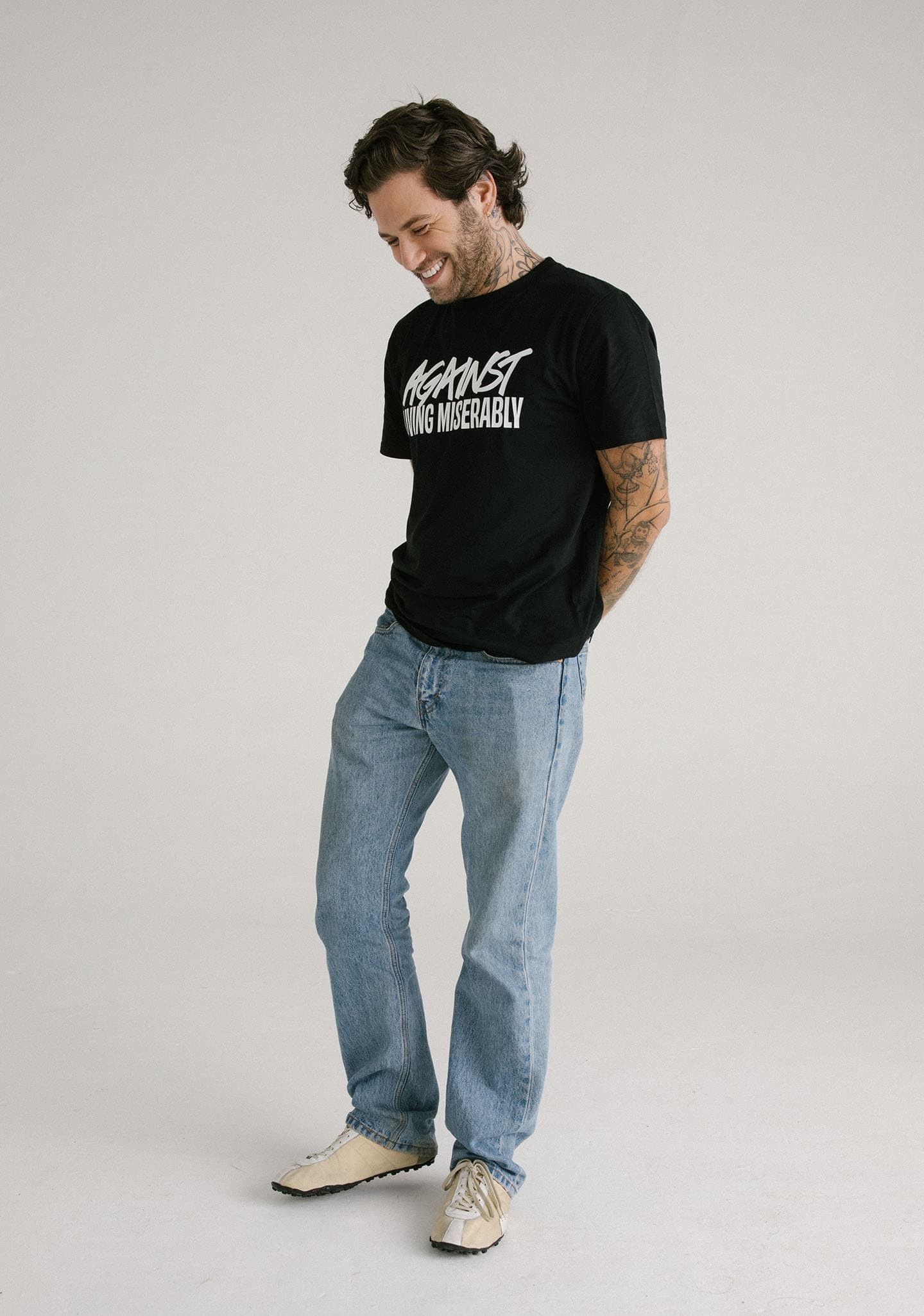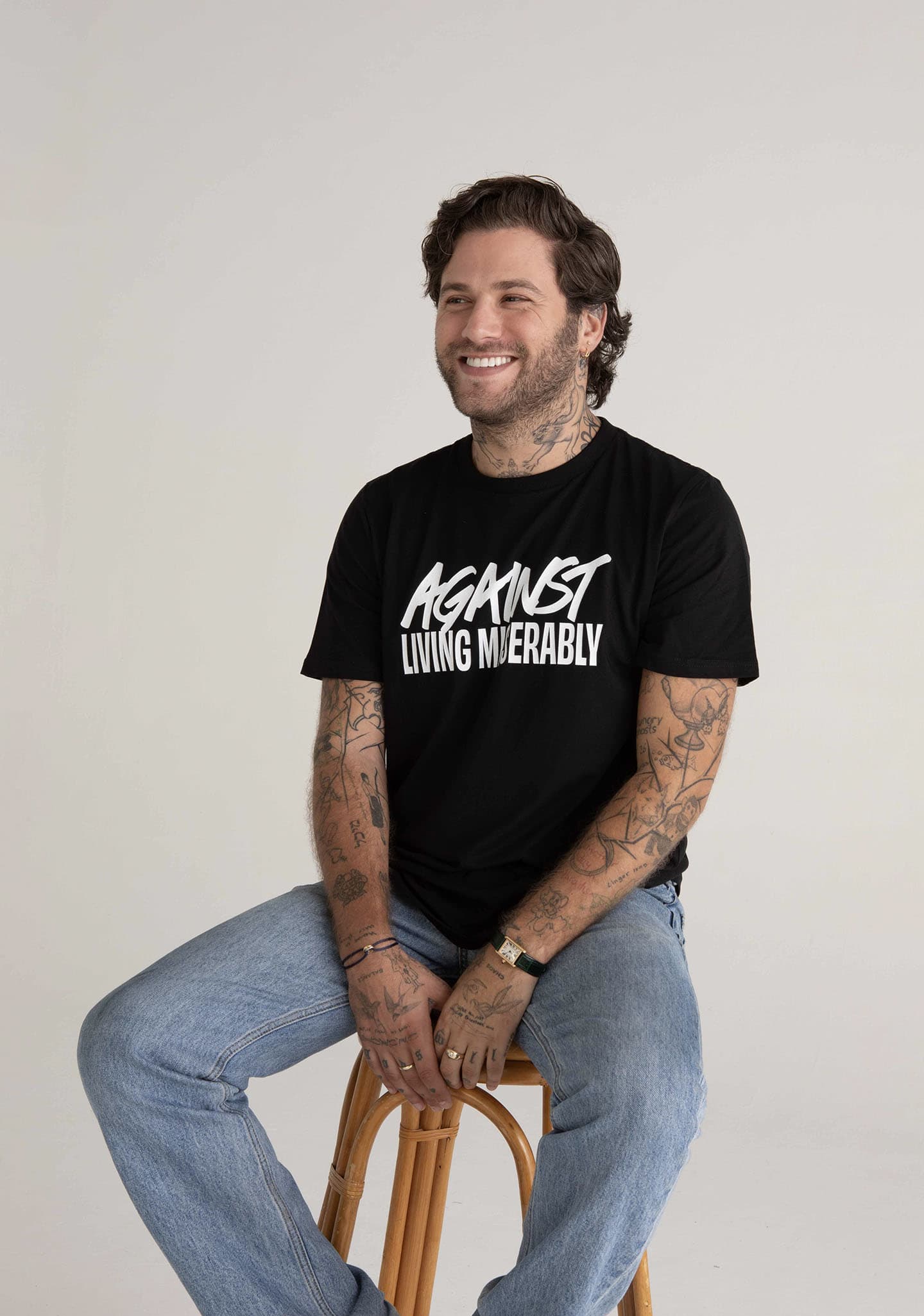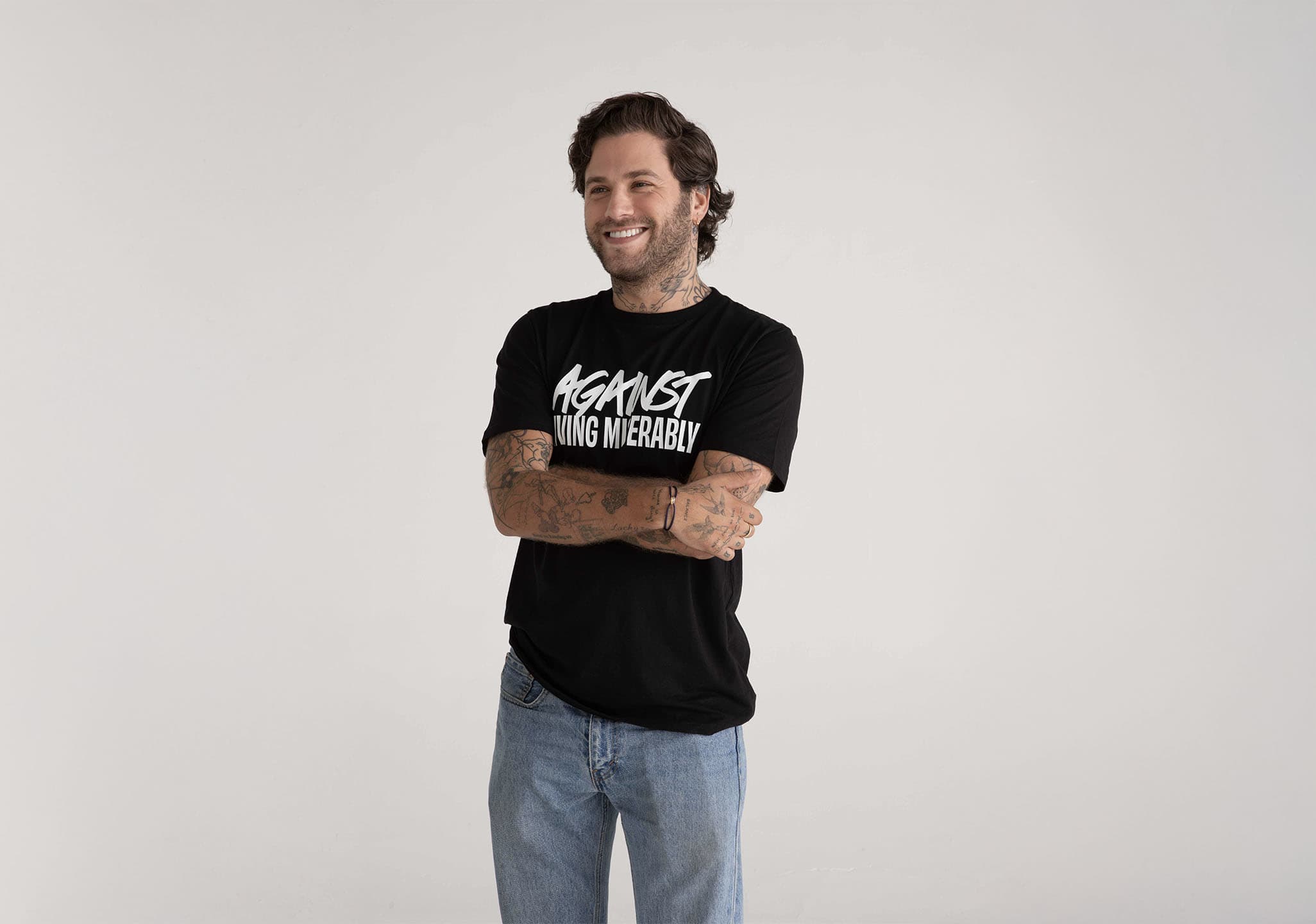“Because I’ve felt that pain and loneliness I’m able to connect to that cause on a deeper level”: Tal Booker on tattoos and mental health

Few people have met as many celebrities as Tal Booker, fewer still have stuck needles in them — but for Tal, that’s just another day in the office. After buying a tattoo gun from Amazon during Covid, Tal began tattooing himself and his friends, developing the distinctive fineline style that’s made him one of the most sought-after artists on London’s tattoo scene. Now working at The London Social, celebrities from James Corden to Tom Grennan, and Lauv to Jessie J have lined up to be tattooed by him.
But for Tal, the process of tattooing is about more than just the art – it’s an opportunity for connection. Every person that comes into his studio and every tattoo that he does has a story — and over the course of a session, Tal will uncover it. Clients have come out to him, talked about parents or children they’ve lost, and examined the ending of their relationships. Hearing their histories is a responsibility that Tal takes seriously, believing that his job is part artist and part “holding space” — a phrase he uses but, laughing, confesses that he hates.
It’s no wonder that people share their stories with Tal, though. He has a gentle demeanour, which would steady even the most uneasy of nerves, and approaches every topic with a considered sincerity. This composure was borne in part from a period of intense self-discovery, as Tal recovered from addiction and navigated a period of bad mental health. Having learnt from that time, he now uses his platform to advocate for suicide prevention with the charity Campaign Against Living Miserably (CALM).
I sat down with Tal to talk about his work with CALM, why he works to make his studio a safe space and his tattoo icks.

You learnt to tattoo by tattooing yourself — what was the first piece you gave yourself?
That’s a good question. I actually don’t know — probably something quite shit. I was in recovery from addiction and there was a saying, ‘Let go and let God’. I think it was that.
Then you moved on to your friends. How was it convincing them to be tattooed by you?
It was worryingly easy. I would tattoo myself and my friends like it wasn’t permanent. I would just get the machine out and kind of go to town. There are a lot of very questionable tattoos that I look at now, and I’m like, I cannot believe you let me do that.
You tattoo a lot of celebrities, how does that experience differ from tattooing the average person?
You know what? I try to treat everyone like they’re the same. Beyond that initial interaction — it being someone that you recognise and that you almost feel like you know, but you don’t actually know — everyone’s the same. Everyone needs to be treated with respect and care and attention, because obviously the tattoos are with them for life.
Who were you most starstruck over?
Probably Paul Mescal. Him and his friends got a matching little linework design. He’s up there with the biggest, especially when it comes to my interest in culture and film.
What are your tattoo icks?
It’s got to be the name of a partner — especially when it’s a new relationship! I did one for someone quite well known who ended up single very shortly after. And at the time, I was… concerned. But who am I to tell someone to not get something? I think it’s up to everyone to make their own mistakes.
And what will you never get sick of tattooing?
I think handwriting from a loved one that’s passed. A grandparent or a parent, something from a birthday card. Tattooing style changes and aesthetics change, but things like that will always be special.

You’ve talked about making your chair a safe space. Why’s that so important for you?
Before I was a tattoo artist, I’d been in a position a number of times where I didn’t feel confident in what I wanted and how I wanted that to translate into the work that I was getting. I feel very strongly about making people feel as comfortable as possible so that they can use their voice, tell me if they don’t like something, if something’s too big or small. If they want to move it, I’ll move it as many times as someone wants. People are like, I’m sorry, it’s so annoying. It’s not! It’s on you forever! One of the biggest parts of tattooing for me is not actually the tattoo itself, it’s the process. You could have a great tattoo that’s technically beautiful, but if the relationship you have with the artist isn’t a good one, then it’s always going to tarnish that.
How did getting tattoos change your relationship with your own body?
I’ve never felt super comfortable with my body. I think I am, maybe victim is not the right word, but I guess I am a victim of social media. Everywhere you look, there’s someone with a better body, better hair, better teeth. I wasn’t comfortable in my own skin and when I started to get tattoos, it was really a way for me to take ownership. It’s like when you’re playing a video game, and you get to customize your character. You can make it whatever you want it to be.
How has that ownership changed your perception?
I think there’s two elements. It’s changed the way that I see myself and it’s also changed the way that other people see me. It kind of allowed me to control how I was perceived. But I think there’s probably a flip side to that. I think there’s an element of me, as a gay man, wanting to be seen as having a certain level of masculinity that I potentially didn’t feel I had. I think tattoos have allowed me to do that — and I don’t know if that’s a good thing or a bad thing.
Knowing that tattooing has affected your own relationship with your body so much, how does it feel to tattoo other people?
I feel extremely connected; there’s a huge sense of responsibility. It will never not be an honour to tattoo someone, because there’s a lot of choice out there, there are a lot of incredible artists for someone to pick. And it’s a massively intimate thing, not just because you’re putting a needle to someone’s skin. It’s just the whole process — you’re learning about someone in a very short space of time. Trying to understand their quirks and their desires and what they’re into and what they like and what they don’t. There’s so much information exchanged in such a short time. There’s nothing like it, really.

You’re an ambassador for CALM. What drew you to their work?
I lost my cousin to suicide when he was nineteen. I was seventeen at the time and that changed everything for me. I don’t really remember knowing much about suicide, or knowing anyone that had taken their own life, or really being connected to suicide in any way. That loss at that time in my life changed the trajectory of who I was, and where I was going, and the way that I saw the world. Then going on my own journey of addiction, recovery, self-discovery and sexuality, I found myself feeling suicidal a number of times. I think because I’ve felt that pain and loneliness that I’m able to connect to that cause on a deeper level.
You’ve talked before about how suicidal thoughts affect men differently and about how men are more conditioned to sit in silence — why do you think that is?
I think it’s ingrained in us from a very young age, boys are taught to not cry. I think there’s a fear of being seen as less masculine or that talking about your feelings makes you gay. And we all know that, growing up, there’s nothing worse than being gay. It just follows us into adulthood, because men are surrounded by other men. They’re being mirrored the whole time and in this kind of echo chamber of silence. When you’re not able to see an alternative, it’s harder to change that.
You’re taking part in CALM’s campaign called Against Living Miserably, can you tell me about it?
At the heart of the campaign is the idea that a small act can drive a big change. And so, it’s kind of opening the conversation around what someone does to stop living miserably. For me, when I am struggling, something that makes me feel better is to paint, so I’ll paint something. Or I’ll spend more time than normal with family, maybe. Everyone has their own version of that. It’s just about finding it.
- WriterRob Corsini




